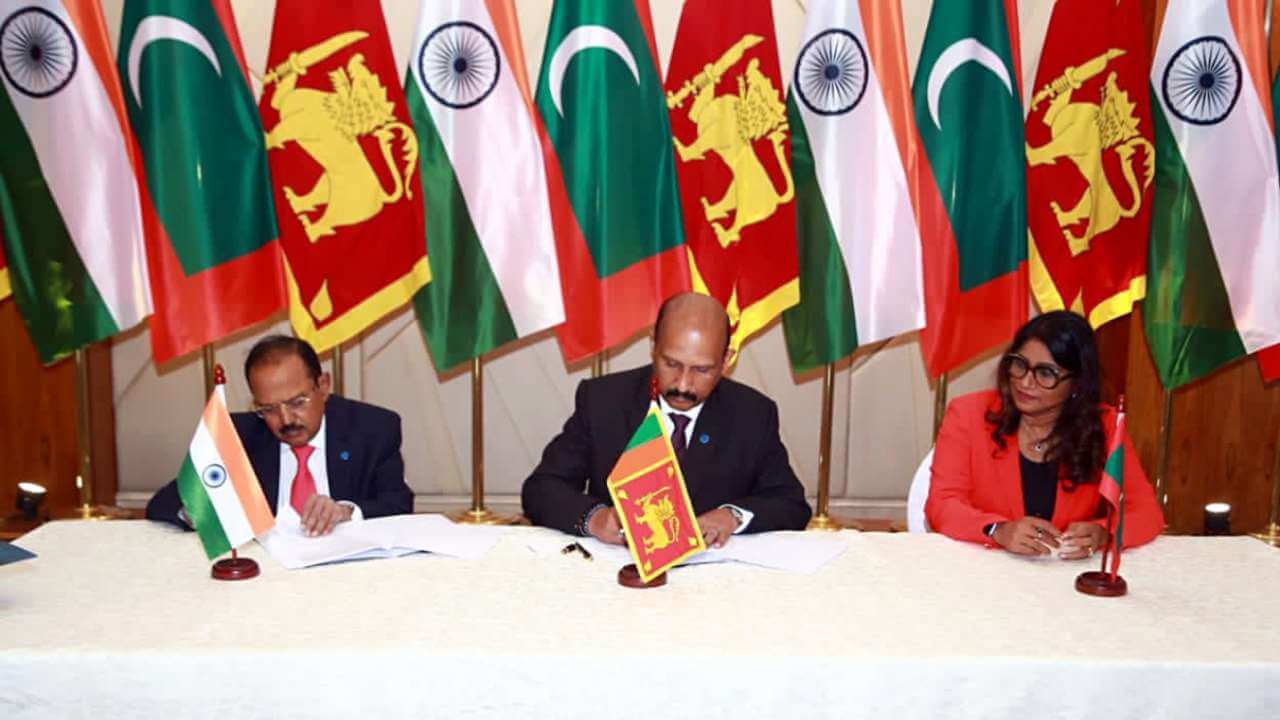India, Sri Lanka, and the Maldives agreed to work together on the “four pillars” of security cooperation during a National Security Adviser-level meeting on Wednesday, virtually hosted by Sri Lanka.
The meeting was chaired by General LHSC Silva, the Chief of Defence Staff and Commander of the Sri Lankan army. The Indian side was represented by Pankaj Saran, the Deputy National Security Adviser, and Aishath Nooshin Waheed, the Secretary of the National Security Adviser’s office, led the Maldives’ delegation. In addition, representatives from Bangladesh, Mauritius, and Seychelles participated as observers.
The Hindu mentioned that the leaders identified “four pillars” of security cooperation”: Marine Safety and Security, Terrorism and Radicalisation, Trafficking and Organised Crime, and Cybersecurity.
The Indian High Commission in Sri Lanka stated that the representatives worked on “specific proposals” on the issues, including joint exercises and training to enhance interoperability and capacity building. Furthermore, the statement read: “The meeting was marked by the convergence of views on common security threats and was held in a warm, positive and forward-looking manner.”
The discussions come almost nine months after representatives from India, Sri Lanka, and the Maldives convened for the “4th National Security Adviser-level Trilateral Maritime Security Cooperation” meeting in Colombo. The trilateral mechanism, held in November 2020, was reconvened this year after a six-year halt. At the meeting, the three sides agreed to bolster collaboration on the “common security threats” posed by terrorism and cybersecurity threats in the Indian Ocean Region. They also agreed to expand their intelligence sharing and cooperate on issues such as “terrorism, radicalisation, extremism, drugs, arms and human trafficking, money laundering, cybersecurity and effect of climate change on the maritime environment.”
The meetings are a part of the “Colombo Security Conclave” established by Sri Lankan President Gotabaya Rajapaksa in 2011 as the erstwhile Secretary to the Ministry of Defence. It aims to strengthen maritime security and cooperation in the Indian Ocean Region.
For India, enhancing cooperation with the Maldives and Sri Lanka is of great importance. Firstly, increasing collaboration between the two strategically situated island-nations in the Indo-Pacific advances India’s goal of countering China’s ongoing aggression in the region. Moreover, the trilateral meeting has allowed India to bring together two countries with a significantly different approach to China.
Maldivian President Ibrahim Solih has also not shied away from accepting a more significant role for India in the region. India has been increasingly concerned about China’s growing influence in the Maldives, which is now more vulnerable to China’s predatory economic policies after the COVID-19 outbreak severely damaged its tourism industry. With ex-President Abdulla Yameen spearheading closer ties with the East Asian giant, the Maldives gathered a debt of over $2 billion with China. However, since President Solih was elected two years ago, India’s relationship with the Maldives has been “reset.” Consequently, the Maldives has also been cooperating with the Quad grouping, which is comprised of India, the United States, Japan, and Australia and aims to enhance defence cooperation in the Indo-Pacific.
Meanwhile, Sri Lanka has taken a rather concerning approach to the Indo-China issue. Despite Sri Lankan Foreign Secretary Jayanth Colombage’s commitment to an “India first approach,” Sri Lanka has continued to increase its economic collaboration with China. However, India continues to work towards a greater Indo-Sri Lankan partnership, and Wednesday’s meeting is a significant step towards achieving this objective.
India, Sri Lanka, Maldives Agree to Co-Operate on “Four Pillars” of Security Cooperation
India, Sri Lanka, and the Maldives conducted National Security Adviser-level meetings and identified “four pillars” of security cooperation.
August 9, 2021

SOURCE: WION
